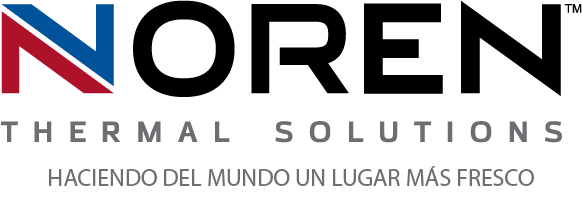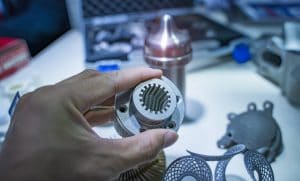 The advent of heat exchangers has been an important part of technological advancement for several decades. Appropriately, the technologies used to design and create heat exchangers have also evolved as manufacturers have implemented more advanced systems to meet increasing demand. One of the most impactful of those advancements has been the use of 3D printing to implement rapid prototyping into the production process. The technology allows companies to rapidly create prototypes of parts and components to test them in real-world applications and make adjustments, when necessary, before the design goes into final production. (more…)
The advent of heat exchangers has been an important part of technological advancement for several decades. Appropriately, the technologies used to design and create heat exchangers have also evolved as manufacturers have implemented more advanced systems to meet increasing demand. One of the most impactful of those advancements has been the use of 3D printing to implement rapid prototyping into the production process. The technology allows companies to rapidly create prototypes of parts and components to test them in real-world applications and make adjustments, when necessary, before the design goes into final production. (more…)
A Few Roles Heat Exchangers Fill Best
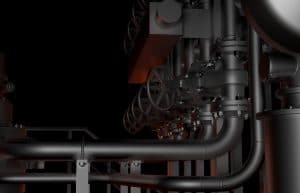 Today, heat exchangers play several important roles in modern companies’ operations. They were initially intended as electrical thermal management solutions that could operate more efficiently than traditional solutions, like air conditioners. However, over the last several decades, their highly efficient and consistently reliable results have helped propel heat exchangers into roles that far exceeded their originally intended ones. For example, in many applications, the ability to transfer heat rapidly and efficiently is essential for more than just preventing electrical overheating. It’s also an important part of several other important processes. (more…)
Today, heat exchangers play several important roles in modern companies’ operations. They were initially intended as electrical thermal management solutions that could operate more efficiently than traditional solutions, like air conditioners. However, over the last several decades, their highly efficient and consistently reliable results have helped propel heat exchangers into roles that far exceeded their originally intended ones. For example, in many applications, the ability to transfer heat rapidly and efficiently is essential for more than just preventing electrical overheating. It’s also an important part of several other important processes. (more…)
How Heat Exchangers Can Be As Tough As You Need Them
 Modern heat exchangers have inherent value when it comes to handling most common electrical thermal management needs. For example, the natural way they handle electrical waste heat while minimizing a company’s need for energy and downtime for maintenance and repairs has created significant cost savings across virtually every industry. That inherent value has been expanded and added to in several ways throughout the years as heat exchangers have become even more adaptable to various industry needs. However, for some industries, that value may be locked away behind one important consideration – the need for rugged thermal management solutions that can handle tougher than usual operating conditions. (more…)
Modern heat exchangers have inherent value when it comes to handling most common electrical thermal management needs. For example, the natural way they handle electrical waste heat while minimizing a company’s need for energy and downtime for maintenance and repairs has created significant cost savings across virtually every industry. That inherent value has been expanded and added to in several ways throughout the years as heat exchangers have become even more adaptable to various industry needs. However, for some industries, that value may be locked away behind one important consideration – the need for rugged thermal management solutions that can handle tougher than usual operating conditions. (more…)
When Thermal Management Means More than Usual
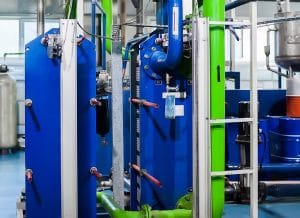 The processes involved with electrical thermal management are one of the few concerns that are shared across every industry. For that reason, improvements in thermal management have impacted virtually every industry, usually for the better. As those advancements have continued over the last few decades, the realm of thermal management has extended beyond just modern electrical cooling processes. For example, in industries that involve the rapid removal or precise application of heat, the ability to transfer it efficiently with advanced heat exchangers has had an even greater impact for most companies’ operations. (more…)
The processes involved with electrical thermal management are one of the few concerns that are shared across every industry. For that reason, improvements in thermal management have impacted virtually every industry, usually for the better. As those advancements have continued over the last few decades, the realm of thermal management has extended beyond just modern electrical cooling processes. For example, in industries that involve the rapid removal or precise application of heat, the ability to transfer it efficiently with advanced heat exchangers has had an even greater impact for most companies’ operations. (more…)
How Many Costs Can Air-to-Air Cooling Reduce?
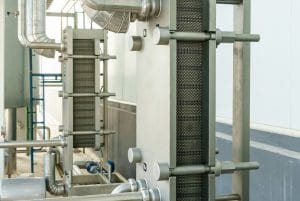 The value in modern electrical thermal management systems can be measured in many different ways, depending on the application for which it’s used. For instance, the rate at which it can eliminate or transfer waste heat is important in helping applications operate at optimal capacity. The level of protection the system offers is important to ensuring thermal management operations remain safe from contamination and the complications that it could cause. In many cases, air-to-air cooling the optimal solution for meeting most modern thermal management needs. With heat exchangers, companies can often find the specific air-to-air cooling solution that suits their needs best and helps make operations more efficient as a result. (more…)
The value in modern electrical thermal management systems can be measured in many different ways, depending on the application for which it’s used. For instance, the rate at which it can eliminate or transfer waste heat is important in helping applications operate at optimal capacity. The level of protection the system offers is important to ensuring thermal management operations remain safe from contamination and the complications that it could cause. In many cases, air-to-air cooling the optimal solution for meeting most modern thermal management needs. With heat exchangers, companies can often find the specific air-to-air cooling solution that suits their needs best and helps make operations more efficient as a result. (more…)
What Efficiency Means when It Comes to Thermal Management
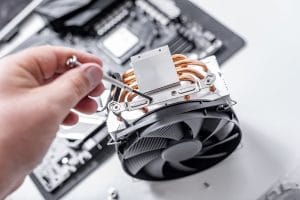 Efficiency is a complicated word in many industries. The goal is usually to improve it, but as technology continues to take over more operations in more industries, that improvement often means tweaking certain aspects of their technologies. For example, implementing a faster, more efficient, and automated system can instantly boost efficiency on the surface, but if maintaining that equipment becomes tedious or burdensome, then it can override that boost in efficiency. To avoid this, companies are increasingly relying on more advanced thermal management systems, such as heat exchangers, that can prevent electrical overheating with optimal efficiency. (more…)
Efficiency is a complicated word in many industries. The goal is usually to improve it, but as technology continues to take over more operations in more industries, that improvement often means tweaking certain aspects of their technologies. For example, implementing a faster, more efficient, and automated system can instantly boost efficiency on the surface, but if maintaining that equipment becomes tedious or burdensome, then it can override that boost in efficiency. To avoid this, companies are increasingly relying on more advanced thermal management systems, such as heat exchangers, that can prevent electrical overheating with optimal efficiency. (more…)
How Else Can Heat Exchangers Impact Green Energy?
 The advancement of green energy initiatives has been one of the most important developments in several different industries over the years. Not only is it a driving demand of modern consumers, it’s also becoming increasingly more mandatory as energy consumption becomes increasingly more impactful. For many companies, such initiatives have become significantly more efficient thanks to the help of modern heat exchanger technology. Their characteristically eco-friendly heat transfer capabilities have made heat exchangers a valuable asset in initiatives that aim to make the most of greener energy efforts. (more…)
The advancement of green energy initiatives has been one of the most important developments in several different industries over the years. Not only is it a driving demand of modern consumers, it’s also becoming increasingly more mandatory as energy consumption becomes increasingly more impactful. For many companies, such initiatives have become significantly more efficient thanks to the help of modern heat exchanger technology. Their characteristically eco-friendly heat transfer capabilities have made heat exchangers a valuable asset in initiatives that aim to make the most of greener energy efforts. (more…)
How Heat Exchangers Work to Make Companies More Productive
 There are many different aspects of a company’s operations that affect its overall productivity, some of which impact the effectiveness of the others. For example, technology is meant to help streamline several different processes. However, if the technology itself isn’t as efficient as it should be, then it could have a negative overall impact, instead. This makes electrical thermal management especially important to a company’s overall productivity; when heat exchangers make electrical cooling simpler and more efficient, the technologies they cool can do a better job of making the company more productive. (more…)
There are many different aspects of a company’s operations that affect its overall productivity, some of which impact the effectiveness of the others. For example, technology is meant to help streamline several different processes. However, if the technology itself isn’t as efficient as it should be, then it could have a negative overall impact, instead. This makes electrical thermal management especially important to a company’s overall productivity; when heat exchangers make electrical cooling simpler and more efficient, the technologies they cool can do a better job of making the company more productive. (more…)
How Companies Benefit when They Upgrade to Heat Exchangers
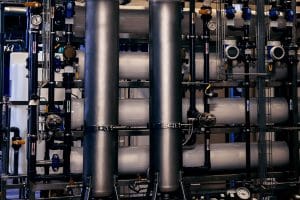 The reason why heat exchangers have remained one of the most popular choices for modern electrical thermal management is because they’ve proven themselves over and over again in many different types of applications. The most common of those types is cooling electrical control panels and other enclosures, a process that often required the use of cumbersome solutions such as air conditioners or air compressors. With heat exchangers, companies have been able to reduce or eliminate their reliance on solutions, which has led to a wide range of benefits that often span across a company’s entire operation. (more…)
The reason why heat exchangers have remained one of the most popular choices for modern electrical thermal management is because they’ve proven themselves over and over again in many different types of applications. The most common of those types is cooling electrical control panels and other enclosures, a process that often required the use of cumbersome solutions such as air conditioners or air compressors. With heat exchangers, companies have been able to reduce or eliminate their reliance on solutions, which has led to a wide range of benefits that often span across a company’s entire operation. (more…)
A Look at the Industrial Impacts of Modern Heat Exchangers
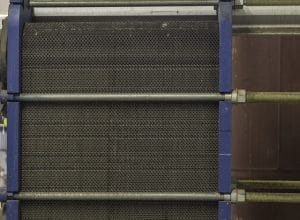 The benefits that modern heat exchangers bring to the companies that utilize them are vast, and in many cases, they’re universal no matter industry the company is in. For example, all industries run on technology to some degree these days, and heat exchangers are well-known for their ability to make electrical enclosure cooling far more efficient. For any company that relies on such enclosures, they can help significantly reduce the costs and burdens associated with keeping them properly cooled. In some cases, however, the industrial benefits of heat exchangers are more closely associated with the specific functions of individual companies and the processes that keep them in business. (more…)
The benefits that modern heat exchangers bring to the companies that utilize them are vast, and in many cases, they’re universal no matter industry the company is in. For example, all industries run on technology to some degree these days, and heat exchangers are well-known for their ability to make electrical enclosure cooling far more efficient. For any company that relies on such enclosures, they can help significantly reduce the costs and burdens associated with keeping them properly cooled. In some cases, however, the industrial benefits of heat exchangers are more closely associated with the specific functions of individual companies and the processes that keep them in business. (more…)

